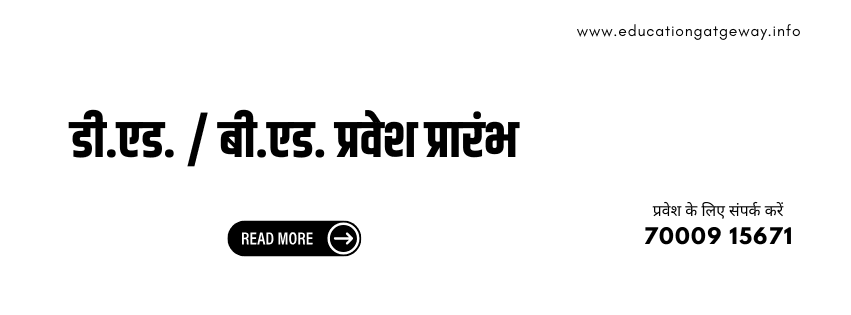

B. Ed, D. Ed, and M. Ed Courses: Eligibility, Admission Procedure & Career Scope
Introduction
Education plays a crucial role in shaping the future of individuals and society. For those aspiring to become educators, courses like Bachelor of Education (B. Ed), Diploma in Education (D. Ed), and Master of Education (M. Ed) provide the necessary skills and knowledge. These programs prepare individuals to teach effectively, manage classrooms, and develop educational strategies. B. Course is in high demand
B. Ed Course – Eligibility, Admission Procedure & Career Scope
Introduction
The Bachelor of Education (B. Ed) is a professional degree program designed for individuals aspiring to become teachers. This course equips students with teaching methodologies, classroom management skills, and educational psychology, preparing them to educate students at the secondary and higher secondary levels.
B. Ed Course Overview
- Course Duration: 2 years (divided into 4 semesters)
- Course Level: Undergraduate (Professional)
- Mode of Study: Regular / Distance Learning
- Regulatory Body: National Council for Teacher Education (NCTE)
- Specializations: Mathematics, Science, Social Science, Language Studies, Special Education, etc.
Eligibility Criteria for B. Ed Course
To pursue a B. Ed degree, candidates must fulfill the following criteria:
- Educational Qualification:
- A bachelor’s degree (B.A., B.Sc., B.Com, or equivalent) from a recognized university with at least 50% marks (45% for reserved categories).
- Some universities may accept candidates with a master’s degree in relevant subjects.
- Age Limit:
- Some universities may have an age restriction (varies by institution and state).
Admission Procedure for B.Ed Course
Admission to B.Ed programs is conducted through entrance exams or merit-based selection, depending on the university and state policies.
1. Entrance Exam-Based Admission
Many universities and states conduct B. Ed Course entrance exams, which evaluate candidates on subjects like teaching aptitude, general knowledge, reasoning ability, and subject expertise. Some well-known entrance exams include:
- DU B. Ed Entrance Exam (Delhi University)
- IGNOU B. Ed Entrance Test
- UP B. Ed JEE (Uttar Pradesh)
- RIE CEE (Regional Institute of Education Common Entrance Exam)
- MAH B. Ed CET (Maharashtra)
- Other state-level B.Ed entrance exams
2. Merit-Based Admission
- Some private universities and institutions offer admission based on graduation marks.
- A minimum percentage (usually 50% or above) is required for direct entry.
Admission Process Steps
- Application Form Submission – Apply online or offline to universities.
- Entrance Exam (if applicable) – Appear for the exam and obtain a qualifying score.
- Merit List Declaration – Based on entrance test scores or graduation marks.
- Counseling & Seat Allotment – Selected candidates choose colleges and finalize admission.
- Document Verification & Fee Payment – Complete the formalities to secure admission.
Career Opportunities After B. Ed Course
A B. Ed Course degree opens doors to various teaching and educational administration roles. Graduates can work in government, private, and international schools, along with educational research and e-learning platforms.
1. Teaching Career
- Primary Teacher (PRT) – For primary classes (1st to 5th grade).
- Trained Graduate Teacher (TGT) – For middle and secondary classes (6th to 10th grade).
- Post Graduate Teacher (PGT) – Requires a master’s degree + B.Ed for higher secondary classes (11th & 12th grade).
- Special Education Teacher – Teaching children with special needs.
2. Government Jobs After B. Ed Course
Candidates can appear for teaching eligibility tests such as:
- CTET (Central Teacher Eligibility Test)
- State TET (Teacher Eligibility Test)
- KVS / NVS / DSSSB (Government school teacher recruitment exams)
- UPSESSB PGT & TGT Exams
3. Other Career Options
- Education Consultant – Advising schools and institutions on curriculum planning.
- School Administrator/Principal – Requires additional experience.
- Online Educator – Teaching via digital platforms like Byju’s, Unacademy, etc.
- Education Researcher – Working on new teaching methodologies and education policies.
- Content Developer – Creating study materials for e-learning platforms.
Higher Studies After B. Ed Course
After completing a B. Ed Course, candidates can pursue:
- M. Ed (Master of Education) – Advanced teaching & education research.
- Ph. D. in Education – Research-oriented career.
- Diploma & Certificate Courses – Specializations in counseling, special education, or educational management.
D.Ed Course – Eligibility, Admission Procedure & Career Scope
Introduction
The Diploma in Education (D.Ed) is a professional diploma-level course designed for individuals who aspire to become primary school teachers. This program focuses on teaching methodologies, child psychology, classroom management, and educational practices to prepare candidates for handling young learners at the nursery and primary levels.
D.Ed Course Overview
- Full Form: Diploma in Education
- Course Duration: 2 years (4 semesters)
- Course Level: Diploma
- Mode of Study: Regular / Distance Learning
- Regulatory Body: National Council for Teacher Education (NCTE)
- Specializations: Early Childhood Education, Special Education, Elementary Education, etc.
Eligibility Criteria for D.Ed
To enroll in a D.Ed program, candidates must fulfill the following requirements:
- Educational Qualification:
- Candidates must have completed 10+2 (Higher Secondary/Intermediate) from a recognized board with at least 50% marks (45% for reserved categories).
- Some institutions may also accept graduates with relevant qualifications.
- Age Limit:
- The minimum age requirement is 17 years.
- Some institutions may have upper age limits, depending on state policies.
Admission Procedure for D.Ed
Admission to D.Ed programs is either merit-based or through state-level entrance exams, depending on the institution and state education boards.
1. Entrance Exam-Based Admission
Some states conduct entrance exams for D.Ed admission, testing candidates in areas like general knowledge, reasoning, teaching aptitude, and language proficiency. Examples of state-level entrance exams include:
- D.Ed CET (Diploma in Education Common Entrance Test) – Maharashtra, Andhra Pradesh, Karnataka
- SCERT D.Ed Entrance Exam – Delhi, Bihar, Odisha
2. Merit-Based Admission
Many institutions admit students based on their 10+2 exam scores. The cutoff percentage varies across states and institutions.
Admission Process Steps
- Application Submission – Apply online or offline through state education boards or universities.
- Entrance Exam (if applicable) – Qualify in the D.Ed entrance test.
- Merit List & Counseling – Selection is based on exam scores or 12th-grade marks.
- Document Verification & Fee Payment – Complete formalities to confirm admission.
Career Opportunities After D.Ed
A D.Ed qualification prepares candidates for teaching and educational roles at the primary and pre-primary levels. Job opportunities include:
1. Teaching Jobs
- Primary Teacher (PRT) – Teaching students up to Class 5 in government and private schools.
- Nursery Teacher – Working in kindergarten and pre-primary schools.
- Montessori Teacher – Educating young learners in play schools and Montessori institutions.
- Special Education Teacher – Teaching children with learning disabilities.
2. Government Jobs After D.Ed
After completing D.Ed, candidates can appear for government teaching eligibility exams, such as:
- TET (Teacher Eligibility Test) – Central & State-level exams for primary teachers.
- CTET (Central Teacher Eligibility Test) – Conducted for teaching positions in government schools.
- State TET Exams – Many states have separate teacher recruitment tests.
3. Non-Teaching Career Options
- Education Counselor – Advising parents and students on learning strategies.
- Curriculum Developer – Designing lesson plans and teaching methodologies.
- School Administrator – Managing school operations.
- Private Tutor / Online Educator – Teaching through e-learning platforms.
Higher Studies After D.Ed
After completing D.Ed, candidates can pursue:
- B.Ed (Bachelor of Education) – Required for teaching at the secondary level.
- M.Ed (Master of Education) – Advanced studies in education management & research.
- Other Diploma & Certification Courses – In special education, early childhood education, or educational psychology.

M.Ed Course – Eligibility, Admission Procedure & Career Scope
Introduction
The Master of Education (M.Ed) is a postgraduate professional degree that focuses on advanced teaching methodologies, educational research, and administration. It is designed for individuals who want to specialize in education management, curriculum design, educational technology, or research. The program enhances teaching skills and prepares candidates for leadership roles in the education sector.
M.Ed Course Overview
- Full Form: Master of Education
- Course Duration: 2 years (4 semesters)
- Course Level: Postgraduate
- Mode of Study: Regular / Distance Learning
- Regulatory Body: National Council for Teacher Education (NCTE)
- Specializations: Educational Psychology, Special Education, Educational Technology, Curriculum Development, etc.
Eligibility Criteria for M.Ed
To enroll in an M.Ed program, candidates must fulfill the following criteria:
- Educational Qualification:
- Candidates must have completed a B.Ed Course (Bachelor of Education) from a recognized university with at least 50% marks (45% for reserved categories).
- Some universities may also accept candidates with a D.El.Ed (Diploma in Elementary Education) + Graduation or B.El.Ed (Bachelor of Elementary Education) with required marks.
- Age Limit:
- There is no specific age limit, but candidates should check individual university guidelines.
Admission Procedure for M.Ed
Admission to M.Ed programs is either through entrance exams or merit-based selection, depending on the university.
1. Entrance Exam-Based Admission
Many universities conduct entrance exams to assess a candidate’s aptitude for education, reasoning ability, and subject knowledge. Some well-known M.Ed entrance exams include:
- DU M.Ed Entrance Exam (Delhi University)
- BHU M.Ed Entrance Exam (Banaras Hindu University)
- IGNOU M.Ed Entrance Test
- AMU M.Ed Entrance Exam (Aligarh Muslim University)
- State-Level M.Ed Entrance Exams (Conducted by various state education boards)
2. Merit-Based Admission
- Some private universities and institutions offer admission based on B.Ed scores.
- A minimum of 50-55% marks in B.Ed is generally required.
Admission Process Steps
- Application Submission – Apply online or offline through university portals.
- Entrance Exam (if applicable) – Qualify in the M.Ed entrance test.
- Merit List Declaration – Based on exam scores or B.Ed marks.
- Counseling & Seat Allotment – Candidates select colleges and finalize admission.
- Document Verification & Fee Payment – Complete formalities to confirm admission.
Career Opportunities After M.Ed
An M.Ed degree opens doors to higher-level teaching, research, and administrative positions in educational institutions. Graduates can work in schools, colleges, universities, educational consultancies, and research organizations.
1. Teaching & Academic Careers
- Lecturer/Professor – Teaching in colleges and universities.
- Higher Secondary Teacher – For senior secondary students (11th & 12th grade).
- Education Trainer – Training teachers and school staff.
- Special Education Teacher – Teaching children with special needs.
2. Government Jobs After M.Ed
M.Ed graduates can apply for government teaching and administrative positions through exams such as:
- NET (National Eligibility Test) – Required for lecturer or professor positions in universities.
- TGT/PGT Teacher Recruitment – For secondary and higher secondary levels.
- Education Officer Roles – Such as District Education Officer (DEO) and Block Education Officer (BEO).
3. Education Administration & Research
- School Principal / Vice Principal – Managing school operations.
- Educational Researcher – Conducting research on teaching methodologies and policies.
- Curriculum Developer – Designing educational programs and lesson plans.
- Educational Consultant – Advising institutions on teaching strategies and curriculum planning.
4. EdTech & Online Learning
- E-learning Content Developer – Creating study materials for digital education platforms.
- Online Educator – Teaching via e-learning platforms like Byju’s, Udemy, Unacademy, etc..
- Education Policy Maker – Working with government and NGOs to improve education systems.
Higher Studies After M.Ed
After completing M.Ed, candidates can pursue:
- Ph.D. in Education – Research-based career in education policy and teaching methodologies.
- M.Phil. in Education – Advanced studies in educational psychology and leadership.
- Postgraduate Diplomas & Certifications – In counseling, special education, and educational technology.
B. Ed Courses: Eligibility, Admission Procedure & Career Scope Read more…
लाइफ कोट्स हिंदी | Life Quotes in Hindi | सुविचार | Suvichar | अनमोल वचन | Anmol Vachan | Success Quotes in Hindi | पॉजिटिव थॉट्स | Positive Thoughts in Hindi | लव स्टेटस | Life Quotes in English | Daily Quotes | Quotes About Life Lesson | Spurutual Quotes
